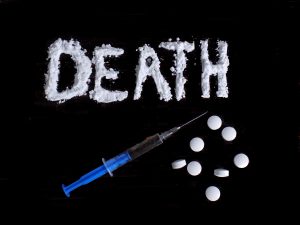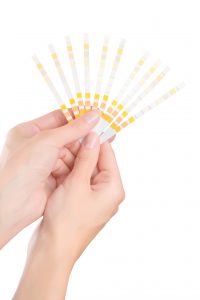by staff | Aug 7, 2017 | Addiction Treatment, Detox, Drug Abuse, Recovery, Withdrawal

(This content is being used for illustrative purposes only; any person depicted in the content is a model)
Repeated and extended use of most drugs can cause physical dependence to develop quickly in the body, and while many people experience symptoms of dependence differently, once it has been established there are typically a number of uncomfortable or even painful adverse effects. Many of these side-effects, specifically withdrawal symptoms, happen when trying to discontinue use of the substance. Many refer to this period of getting off of drugs as the detox stage. Detoxing from some substances can be harder on the body than others, while some can actually become life-threatening. When attempting to get off of drugs one of the most commonly asked questions is- how long does it take to detox your body from drugs?
There is no one-size-fits-all answer to this question. Withdrawal symptoms can appear quicker and last longer, depending on the individual and the factors of their drug use.
How Long Does it Take to Detox Your Body from Drugs: Questions to Ask
Because not everyone is exactly the same, their body will react differently based on their own personal health and their own habits. Typically an individual will experience the most serious withdrawal symptoms in the first two weeks of detox, but there are so many things that contribute to how this experience will affect you.
Here are a few questions you may want to ask:
-
What is the drug?
Different drugs will have different detox periods because of how long they stay in the system.
-
How much do you usually take?
For those who take larger amounts, they increase the chances of the body building up more of a tolerance to the drug.
-
How often do you use the drug?
Someone taking a drug multiple times a day every day has a better chance of developing a stronger dependence quicker than someone who uses once every couple of days.
-
What is your metabolism like?
Of course something that impacts how long a drug stays in your body is your metabolism. The quicker your body burns through fat, nutrients and other resources the quicker the residual deposits of the drug in the body will dissipate.
-
Are you generally healthy?
Those who not only take care of themselves, but are healthier in general may have an easier detox experience than those who are already not healthy and more often ill. For each individual there are a number of personal health that impact how long a drug stays in the system, including:
- Height
- Weight
- Age
- Genetics
- Gender
- Body fat
- Health of the liver
- Kidney health
- Hydration
Many key organs are involved in the metabolism or elimination of many of the drugs you take, such as digestive organs, respiratory organs, liver and kidneys. Some studies have made rough estimate of how long withdrawals may last for certain substances. However one cannot guarantee a general timeline can tell how long detox will take accurately considering each individual’s own health and habits can make these timelines vary.
How Long Does it Take to Detox Your Body from Drugs: PAWS
Sometimes people don’t expect to experience withdrawals after a certain point because they think the body has already overcome its dependence, however there are other effects of drugs that can be a challenge.
Post-Acute Withdrawal Syndrome (or Protracted Withdrawal Syndrome) is often referred to as PAWS. This the second stage of withdrawal. PAWS causes recovering addicts and alcoholics to feel some symptoms of withdrawal long after the initial withdrawal phase is over. So you may have fewer physical symptoms, but there are much more emotional and psychological symptoms that can continue to bother you.
PAWS occurs because your brain chemistry is gradually returning to normal. As your brain heals without constant use of potent drugs, the levels of brain chemicals fluctuate as they approach the new equilibrium.
Common Post-Acute Withdrawal Symptoms include:
- Mood swings
- Anxiety
- Irritability
- Variable energy
- Low enthusiasm
- Variable concentration
- Disturbed sleep
PAWS can often mimic depression, and increases the risk of relapse. So while the body may start to feel more refreshed and the aches and pains of physical dependence may be getting better, the brain is still struggling.
How Long Does it Take to Detox Your Body from Drugs: Why Medical Detox Matters
Some people may ask how long does it take to detox your body from drugs because they want to try and detox at home. This may seem like a more convenient approach, but it is definitely not the safest or most effective way. Medical detox matters because it is not so simple to predict how long someone will experience withdrawals.
Because some may experience detoxing from drugs differently, having an experienced medical staff, along with addiction specialists creates a safer and more effective environment to detox. Medical detox provides a safe and secure space to get through this beginning difficult stage of recovery, while offering quality care and assistance to each individual and their needs.
The Palm Healthcare Company detox facility has a 24-hour medical and addiction professional staff to continuously evaluate individual progress and provide comprehensive support during this process. Our highly qualified specialists genuinely strive to make recovery possible for everyone who needs help. If your or someone you love is struggling with substance abuse or addiction, please call toll-free.
CALL NOW 1-888-922-5398
by Sher Delva | Jun 9, 2017 | Addiction, Addiction Stigma, Addiction Treatment, Drug Abuse, Withdrawal

Drug Overdose Now Leading Cause of Death for Americans Under 50
The numbers are in. Drug overdoses are the leading cause of death for Americans under the age of 50.
Not car crashes or cardiovascular disease… drug overdoses.
To put the opioid crisis in perspective:
Opioid deaths have now surpassed:
Comparing those numbers to recent tragedies like the Pulse Night Club Attack, there would have to be three mass shootings every day for 365 days to roughly equate to the number of drug overdoses in 2015.
Officials across the country declare the drug overdose epidemic as a public health crisis. In the past decade or so, the numbers of fatalities related to drug overdoses have soared.
Deputy Attorney General Rod Rosenstein officially announced the statistic on drug overdoses Tuesday to the media. Chuck Rosenberg, acting head of the Drug Enforcement Agency, and other prominent officials in law enforcement also addressed the media at the DEA’s headquarters in Arlington, VA.
“We’re not talking about a slight increase. There’s a horrifying surge of drug overdoses in the United States of America. Some people say we should be more permissive, more tolerant, more understanding about drug use. I say we should be more honest and forthcoming with the American people on the clear and present danger that we know face,” opened Rosenstein.
“Fentanyl is especially dangerous. It is 40 to 50 times more deadly than heroin. Just two milligrams, a few grains of salt, an amount you could fit on the tip of your finger, can be lethal. Fentanyl exposure can injure or kill innocent law enforcement officers and first responders. Inhaling a few airborne particles can have dramatic effects,” he continued.
Despite such a bleak update, there was an air of optimism. Rosenberg spoke extensively with his Chinese counterparts in law enforcement about reducing fentanyl distribution. China is the major source of fentanyl that enters America. According to Rosenberg, the Chinese government banned 116 synthetic opioids for export and four more after his trip to China this March. Additional synthetics are scheduled for banning in the future.
“I do not want to understate such gains, nor do I want to overstate them,” he cautioned.
Still, we need more progress in international cooperation, he explained.
Rosenberg and other law enforcement officials assessed the challenges behind training first responders and admit that such efforts would stretch the limited resources available for fighting such an overwhelming epidemic.
Rosenberg’s daunting assessment of fentanyl put in perspective the existential danger of the ongoing opioid crisis. Rosenberg continues to reiterate the paths made thus far, but there is much more progress needed to improve the dire situation.
Overall, it is difficult to fully grasp the scope of the opioid epidemic. These statistics often “wash over” our minds, Rosenberg admits. If you or someone you know is currently struggling with opioid addiction, you know more than anyone how tragic and helpless it can be. Those who do not have a personal experience often struggle to understand these numbers.
However, the numbers do not lie. In Florida alone, every 15 hours last year, someone died of an opioid overdose in Palm Beach County, nearly double the rate of murders and fatal car crashes.
Addiction is a disease and needs treatment. We need to raise awareness, not stigma. More and more people are losing their lives to overdoses. The stigma has to end. If you are someone you know is struggling with drugs or alcohol abuse, please call now. You are not alone. You need help. Call today.
CALL NOW 1-888-922-5398
by Sher Delva | May 22, 2017 | Addiction, Addiction Medicine, Addiction Stigma, Mental Health, Stigma, Therapy, Uncategorized

A needle exchange program in the Bronx, New York is stepping up to combat the ongoing opioid crisis and rising overdose death rates. Their latest tactic is handing out fentanyl test strips to heroin users.
The reasoning behind the test strips is to lower overdoses due to fentanyl-laced heroin.
Staff member Van Asher explains that the test strips will help addicts determine whether or not there is fentanyl is the drugs they’re using. The strips are usually used to drug test urine, but people can put a little of the mixture that’s in their syringe onto the strip to test whether or not what they are injecting contains fentanyl. This will help them make a more informed decision about what they are putting in their bodies, Asher explained to NPR.
Studies conducted by the Centers For Disease Control and Prevention revealed that most people do not know whether the heroin they’re using contains fentanyl. Asher told NPR that he started handing the strips out of desperation to curb the overdose rates among his clientele.
With each strip, Asher gives a survey to fill and report back. Unfortunately, Ashley admits getting clients to follow through is a difficult task.
Still, Asher is now working with programs around the country to try to replicate his idea. The idea originated at Inside in Vancouver Canada, North America’s only safe injection facility.
However, the major difference is that if someone is choosing to use their fentanyl-laced heroin at Inside, they can be medically monitored and an overdose is more likely to be reversed by staff, preventing death.
In the United States, safe injection facilities do not exist yet. While there are few areas testing the concept, none have yet to become established. Furthermore, harm reduction strategies remain a controversial topic. Therefore, it is up to the drug user to monitor how they use the drugs.
Some simply are not convinced.
Drug users like Vincente Estema explain that knowing there is fentanyl in his heroin is not going to stop him from using.
“It’s stronger! If it makes me feel the euphoria, I’m going to go for it,” he told NPR.
When an addict is at the point of wanting to use drugs, it is unlikely that the fentanyl test strips would deter them from using. However, it would at least inform them of the risk they are taking, and could potentially reduce the amount of the drug they take.
In 2015, the spike in fentanyl-laced overdose deaths led the Drug Enforcement Administration to issue a nationwide warning about the drug.
“Drug incidents and overdoses related to fentanyl are occurring at an alarming rate,” said DEA Administrator at the time, Michele Leonhart, calling it a “significant threat to public health and safety.”
During a three-month period in 2016, 74% of opioid overdoses in Massachusetts were caused by fentanyl! Fentanyl is up to 100 times stronger than morphine and is the strongest opioid available to doctors; even worse, different variations of fentanyl are hitting the streets like carfentanil and acryl fentanyl.
The numbers from Massachusetts indicate that heroin overdoses are dropping, but opioid-related overdose deaths continue to increase. Authorities agree that fentanyl is to blame. In a press release, Massachusetts Secretary of Health and Human Services Marylou Sudders called the data, “a sobering reminder of why the opioid crisis is so complex.”
Do you believe these strips could help combat the opioid epidemic? Would it affect how an addict uses? Regardless, any addict continues to use needs to seek help instead. The next time you use could be your last. Recovery is possible. We want to help you. Call now.
CALL NOW 1-888-922-5398
by staff | May 3, 2017 | Addiction, Addiction Medicine, Addiction Stigma, Addiction Treatment, Detox, Maintenance Drugs, Methadone, Suboxone, Therapy, Vivitrol, Withdrawal

(This content is being used for illustrative purposes only; any person depicted in the content is a model)
When it comes to overcoming a serious drug addiction it is essential to start strong on the road to recovery with a healthy and stable foundation. With most substances detoxing is not particularly fatal, but there are some drugs that can cause life-threaten detox symptoms without consistent medical care. So when people ask- can I detox from drugs at home- it is technically possible to go “cold turkey”, but chances are it’s going to be extremely painful and in some cases is far too dangerous to risk.
Detoxing from drugs in a safe medical environment is worth the effort for multiple reasons, regardless if you could technically survive the detox on your own, and especially when withdrawals could become lethal.
Sustainable and fulfilling sobriety means consistent work on both the physical and the mental and emotion aspects of addiction. Drugs and alcohol are not the only symptom to addiction; and overcoming withdrawal is not the only benefit of safe medical detox.
You may still be struggling to accept that it isn’t a matter of pure willpower. Maybe you are a parent or family member who just wants to help your loved one. Either way some people resist reaching out for help. Still, the truth is that trying to detox at home isn’t just an unnecessary risk, it can also be incredibly dangerous or even fatal.
Can I Detox From Drugs at Home: Withdrawals
The fear of the pain and discomfort of withdrawal symptoms is often the primary reason why most people never get a fair shot at getting off of drugs. A lot of people end up trying to figure out how to detox from drugs at home, but many find themselves being unsuccessful because of the difficulties they face and the lack of support. Some of the more general withdrawal symptoms people experience when coming off of drugs includes:
- Anxiety
- Irritability
- Panic attacks
- Difficulty concentrating
- Short-term memory loss
- Disturbed sleep
- Headache
- Heart palpitations
- Tremors
- Sweating
- Nausea
- Muscle pain
- Hypertension
- Irregular heart rate
Of course, some drugs are more powerful and thus more damaging. If someone tries to detox at home “cold turkey” from certain substances they may accidentally cause serious damage to their body and/or vital organs.
When asking- can I detox from drugs at home- we also have to consider any pre-existing conditions, or conditions that may have been created through long-term drug use. There are also medical complications during the detox process that most cannot diagnose or treat at home.
Some drug withdrawals can actually kill. Alcohol withdrawals are extremely dangerous, and abruptly stopping some drugs without medical monitoring and assistance is especially hazardous. Ultimately, the specific substance, the length of use and the severity/frequency of use will determine how difficult the detox process will be.
Can I Detox From Drugs at Home: Maintenance Drugs
Again, the difficulty of the detox process can be physically overwhelming. One way people try to fight the withdrawal symptoms from home is by using maintenance drugs, such as:
If you would like more information on Suboxone, download our free E-book: 5 Things No One Tells You about Suboxone.
DOWNLOAD FREE E-BOOK
While these can be useful elements of treatment, often times these methods are unsustainable in the long-term. Some maintenance drugs like Suboxone have side-effects and withdrawal symptoms of their own, which pretty much defeats the purpose.
With methadone people visit clinics to receive doses of a maintenance drug that also is well known for its own horrible withdrawal symptoms.
In the end, those who practice in the field of addiction treatment the medical community agree that these drugs are only ever useful when accompanied by cognitive behavioral therapy or comprehensive addiction treatment. They should not be used as an extended solution to a more complex issue.
Can I Detox From Drugs at Home: Behavioral Therapy
If you’re asking, “can I detox from drugs at home?” then you are probably forgetting one of the most important parts of addiction treatment. Beyond getting through the physical side of detox, there is so much more to recovering from drugs.
While most people think of detox as just the first stages of trying to get clean, there are still opportunities to lay the ground work for continued growth and personal development. Having the time away from the influences of the outside world, you can focus on beginning to change addictive behaviors in a secure facility.
Behavioral therapy and other holistic treatment methods are crucial ways of starting off on a path to recovery from drugs and alcohol. Creating new coping skills and confronting underlying issues can be the key to moving forward progressively while also preventing relapse.
Can I Detox From Drugs at Home: Safe Medical Detox
Addiction treatment professionals agree that detoxing from drugs should always be done with the supervision and support of a trained and experienced medical staff.
People do attempt detoxing from home, but it is still an unnecessary level of discomfort and risk. People do also die from trying to detox from dangerous drugs at home without the proper support. It is important to stress why even though it may be ‘possible’ to try detoxing from drugs at home, it can also be deadly. There are more than enough resources out there, and people willing to help.
At Palm Healthcare we believe in providing drug and alcohol detox with 24-hour assistance from an experienced medical staff to continuously evaluate individual progress, administer the appropriate levels of medications and provide unlimited support during this process. Our highly qualified specialists genuinely strive to make recovery possible for everyone who needs help. If your or someone you love is struggling with substance abuse or addiction, please call toll-free.
CALL NOW 1-888-922-5398





